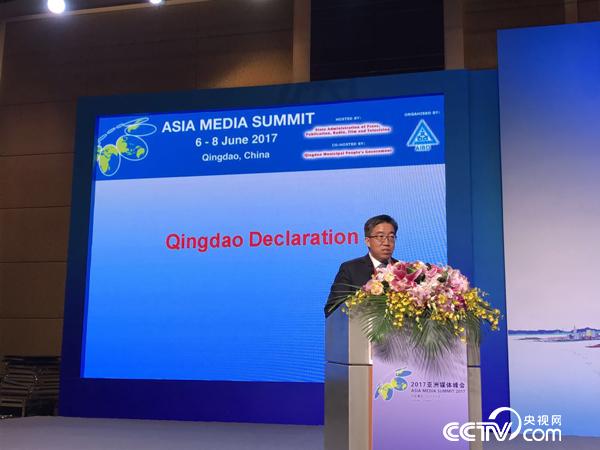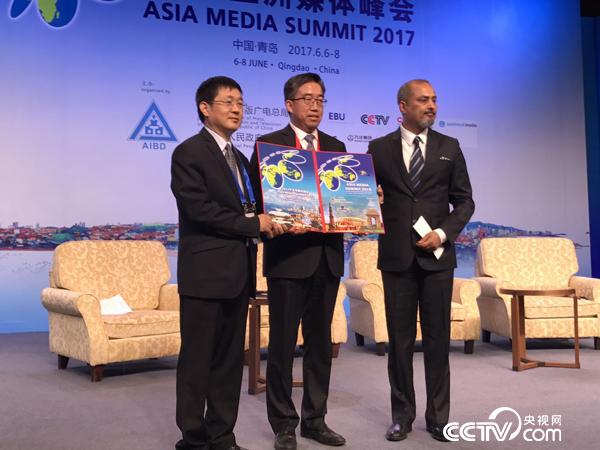By Li Shouen, CCTV.com reporter
At the closing ceremony of the Asia Media Summit (AMS) 2017 held in Qingdao, Shangdong on June 6 – 8, the Qingdao Declaration on Media and the World’s Sustainable Development was ratified and issued.

Chang Jin, Director of Asia-Pacific Institute for Broadcasting Development, on behalf of the organizing committee of AMS 2017, announces the issuance of Qingdao Declaration Photo/Li Shouen
And on behalf of the host city for next year’s AMS, Delhi, India, Rajeev Singh, Chief Executive Officer of Prasar Bharati, India, extends their invitation to all participants.

The Chair is handed over from Qingdao to Delhi, host city of AMS 2018 Photo/Li Shouen
The following is the full text of the Qingdao Declaration.
Qingdao Declaration
Media and the World’s Sustainable Development
Qingdao, China, June 7, 2017
Preamble
Mindful of the pressing challenges facing our world, among them, poverty, conflict, economic inequality, environmental degradation and climate change that call for urgent and concerted action to accelerate development and progress in our society;
Noting that there are several creative and innovative mechanisms to achieve sustainable development, appropriate to every country’s own needs, expectations and pace of development, and demanding participation and support from government, private sector, civil society, local community, family and individual alike;
Supporting the ends of the UN-led 17 Sustainable Development Goals adopted by more than 150 world leaders from 193 UN Member States in September 2015 to end poverty, protect the planet and ensure prosperity for all over the next 15 years;
Aware that sustainable development demands effective and efficient management of our limited resources, that necessitates a system of accountability beneficial to good governance;
Emphasising that practitioners in the traditional and emerging media are among key stakeholders that can raise public awareness, change attitudes and behaviour favourable to serving the ends of development without risking professional and ethical standards;
Believing that media can play a positive role in fostering public participation and safeguarding the right to information, right to speech and right to supervision in the pursuit of sustainable development;
Recalling the efforts of the Asia Pacific Institute for Broadcast Development (AIBD) to support discussion and debate on development issues in previous Asia Media Summits and national and regional workshops, and partner in UN-led communication programs, in particular for the Millennium Development Goals (MDGs);
We, media stakeholders in the broadcast industry who participated in the 14th Asia Media Summit 2017 held in Qingdao, People’s Republic of China on June 6-8, 2017, hosted by the State Administration of Press, Publication, Radio, Film and Television (SAPPRFT) of the People’s Republic of China and the Qingdao Municipal People’s Government, focused on the theme “ Media on the Frontline of Global Development,” do hereby adopt the following declaration:
I. Media
Cognisant of media’s role to ensure messages of sustainable development are heard and heeded in Asia Pacific and in our world, we commit to work towards the following action program:
a. to optimise media resources, including the use of new media and social media, in acknowledging the shared responsibility to promote a more sustainable future. This may require incorporating this principle of shared responsibility into our editorial policies.
b. to work towards tracking the progress of SDGs and publishing the outcomes of SDGs-based activities and programmes carried out by the relevant authorities, businesses and civil society. This demands allocating more resources for coverage of sustainable development stories, virtually a gold mine of stories waiting to be tapped, whether the stories are of international or national nature.
c. to support efforts to train broadcast editors and journalists in order to understand diverse nuances of sustainable development issues and improve reporting in various media platforms.
d. to support efforts for the right to participation, the right to information, the right to speech and the right to supervision in order to help ensure accuracy and fairness, provide background and context and contribute to public understanding and analysis of sustainable development concerns.
e. to focus on grassroots issues, in particular affected marginalised peoples in highlighting the various dimensions and challenges of sustainable development in societies.
f. to promote media literacy by developing greater critical awareness and understanding of media content, in particular SDGs concerns, among listeners, viewers and readers, building their confidence and skills to become media literate, and encouraging consumers to move from passive to active media consumption.
g. to help ensure safety of journalists as recognised in the UN Plan of Action on the Safety of Journalists and the Issue of Impunity.
h. to promote diversity in the media organisations through adoption of human resources policies favourable to the entry of competent people regardless of gender, age and status in life.
i. to adopt gender-sensitive policies and strategies to foster participation of women that will enhance public debate, and combat historical prejudices discrimination and biases to ensure equal enjoyment of rights and enhance human respect.
j. to encourage media organisations, including our own entities to undertake SDGs projects as part of their corporate social responsibilities, working with government and civil society to generate better outcomes.
k. to reflect a diversity of views and perspectives in various programme genres that will offer listeners and viewers a broad range of information and ideas.
l. to encourage investigative journalism that can provide in-depth, comprehensive and analytical presentation of SDG issues and concerns.
m. to carry out these duties according to domestic laws and national legislations.
II.Government
We call upon governments in the Asia Pacific and other parts of the world, through all necessary and possible means, to support media in their efforts to promote the SDGs. We urge them to pursue the following actions:
a. to work towards universal access to the Internet and other ICTs that can facilitate free flow of information and public participation.
b. to be committed to supporting media’s positive role in fostering public participation and safeguarding the right to information, right to speech and right to supervision, in covering agenda related to sustainability development.
c. to be committed to reviewing regulations and laws in order to facilitate access to information so as to enhance public awareness and understanding of SDG-related projects.
d. to help ensure safety of journalists, especially those who are at risk of being harassed or attacked in pursuit of their work, and rapid and effective investigation of reported attacks against journalists.
e. to support training activities of practitioners in government-owned and run media organisations that will enhance skills and competence useful in reporting SDGs.
III. UN Agencies and international non-profit organisations
a.to be committed to the support of fostering public participation and safeguarding the right to information, right to speech and right to supervision, and support media to play their complete role in reporting sustainable development initiatives.
b.to assist in identifying and obtaining diverse resources helpful in media’s tasks to report sustainable development issues.
c.to promote and monitor safety of journalists.
d.to support through various mechanisms media programs, including AIBD’s initiatives, in enhancing skills and competence of journalists and editors as well as production and technical people.















